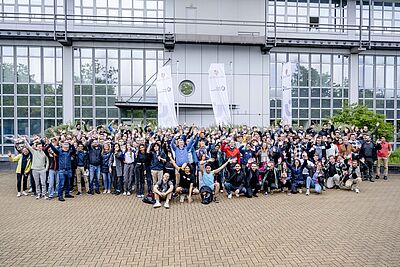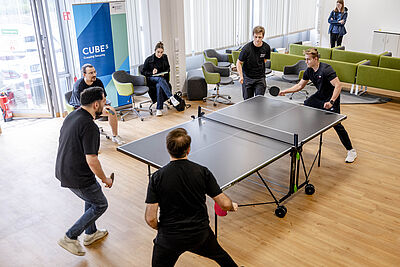The Horst Görtz Institute Marks Milestone at Cybersec Day
What began 25 years ago as a bold academic venture has since evolved into one of Ruhr University Bochum’s (RUB) signature strengths. This year, the university’s IT Security (ITS) study program marks its 25th anniversary — a milestone celebrated at the annual Cybersec Day, where more than 200 guests gathered to honor a quarter-century of education, research, and technological advancement.
The weather may have been rainy, but the atmosphere was anything but subdued. Researchers, students, alumni, and friends of the Horst Görtz Institute for IT Security (HGI) came together for a day shaped by exchange, insight, and celebration. The morning was dedicated to academic dialogue, featuring lightning talks, speed networking sessions, and expert discussions. In the afternoon, the event opened to the broader HGI community, offering keynote remarks, a retrospective on 25 years of cybersecurity study program at RUB, and a summer festival complete with outdoor games, a ping-pong tournament, and music.
Groundbreaking decision 25 years ago
In his opening remarks, HGI Spokesperson Ghassan Karame struck an upbeat tone, highlighting why there was every reason to celebrate: 'We rank among Europe’s top institutes for IT security – and we’re determined to keep pushing this success story forward.' The roots of this success trace back to a forward-thinking decision made a quarter-century ago.
In 2000, entrepreneur Horst Görtz pledged a transformative donation to Ruhr University — with one clear condition: that IT security should not remain confined to research alone, but become firmly established in academic teaching. “He insisted on one thing. He wanted a dedicated degree program in cybersecurity to be created,” recalls Prof. Dr. Christof Paar, one of HGI’s founding faculty and now Director of the Max Planck Institute for Security and Privacy in Bochum. “At the time, cybersecurity was still a niche topic”, he says. RUB responded swiftly and decisively — embodying a spirit that continues to shape the research community: Move fast and break things. With courage and vision, supported by Görtz’s generosity, the university launched a degree program, laying the foundation for today’s success.
What started with just 30 pioneering students has since grown into one of Europe’s largest and most dynamic cybersecurity study programs, boasting over 800 enrollments. ITS has become a beacon for top talent, drawing students from across Germany and beyond.
“After finishing school, I was fascinated by the combination of mathematics, computer science, and electrical engineering,” says Felix Uhle, an alumnus of the program. “At first, IT security meant hacking to me — but during my studies I discovered how broad and impactful the field truly is, from securing digital IDs to protecting microchips. That’s what excites me most today.”
A degree programme with depth and breadth
A hallmark of the Bochum program is its distinctive blend of academic depth and breadth. Core disciplines such as computer science, mathematics, and electrical engineering are seamlessly integrated with cutting-edge topics in cybersecurity — including human factors and artificial intelligence. The curriculum is research-driven and interdisciplinary, and is deeply embedded in an unrivaled academic ecosystem. HGI faculty members have earned numerous prestigious honors, including the Gottfried Wilhelm Leibniz Prize and multiple ERC Grants. The continued funding of the Excellence Cluster CASA (Cyber Security in the Age of Large-Scale Adversaries) further affirms Bochum’s standing as an international hub for cybersecurity research.
Yet research excellence is only part of the story. The institute’s vibrant student community also plays a central role in shaping ITS’s identity. During Cybersec Day, the ITS student council showcased a wide range of extracurricular activities — from game nights to hackathons. Te internationally ranked CTF team of the RUB, “FluxFingers e.V.,” a regular contender at top-level competitions, was also present at the summer festival. “We work closely with other departments and even host joint hacking events with Bochum startups,” notes a speaker of the student council.
ITS at Ruhr University Bochum is more than a degree program - it is a thriving community and a launchpad for the next generation of cybersecurity innovators. One fact is clear: demand for skilled experts in this field will only continue to rise.
“A degree from this program opens doors in research, industry, and government alike,” Adolph concludes.
So there are many good reasons to celebrate in Bochum - and to look to the future with confidence.
General note: In case of using gender-assigning attributes we include all those who consider themselves in this gender regardless of their own biological sex







